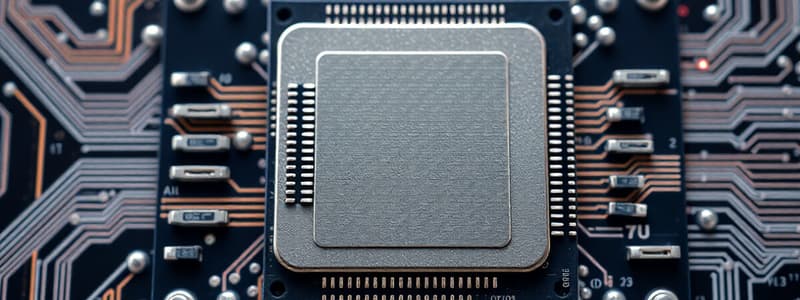Podcast
Questions and Answers
What is the primary function of the Central Processing Unit (CPU)?
What is the primary function of the Central Processing Unit (CPU)?
The CPU acts as the brain of the computer, controlling how the rest of the computer functions.
What roles do the Control Unit (CU) and the Arithmetic and Logic Unit (ALU) play in the CPU?
What roles do the Control Unit (CU) and the Arithmetic and Logic Unit (ALU) play in the CPU?
The CU carries out software instructions and directs data flow, while the ALU performs calculations and logic operations.
How does the Control Unit (CU) assist the CPU?
How does the Control Unit (CU) assist the CPU?
The CU assists the CPU by executing instructions from software and managing the flow of data within the computer.
What types of operations does the Arithmetic and Logic Unit (ALU) perform?
What types of operations does the Arithmetic and Logic Unit (ALU) perform?
Describe the relationship between the CPU, CU, and ALU.
Describe the relationship between the CPU, CU, and ALU.
Which of the following is NOT categorized as an input device?
Which of the following is NOT categorized as an input device?
Which input device can be used for capturing sound?
Which input device can be used for capturing sound?
An Optical Character Reader (OCR) is primarily used for what purpose?
An Optical Character Reader (OCR) is primarily used for what purpose?
Which device would be suitable for inputting data in a retail setting as an item is scanned?
Which device would be suitable for inputting data in a retail setting as an item is scanned?
What type of input device is commonly used for biometric verification?
What type of input device is commonly used for biometric verification?
Flashcards are hidden until you start studying
Study Notes
Central Processing Unit (CPU)
- The CPU is referred to as the "brain" of the computer, responsible for controlling operations and overall functioning.
- It coordinates and executes instructions from software applications.
Components of the CPU
- The CPU consists of two main components: the Control Unit (CU) and Arithmetic Logic Unit (ALU).
Control Unit (CU)
- The CU is responsible for interpreting instructions and overseeing the flow of data within the computer.
- It ensures that data transfer between components occurs efficiently and accurately.
Arithmetic Logic Unit (ALU)
- The ALU performs essential arithmetic operations, such as addition and subtraction.
- It also handles logical operations, enabling decision-making processes within computational tasks.
Input Devices Overview
- Input devices allow users to enter data into computers.
- Common input devices include a mouse, keyboard, scanner, and microphone.
Types of Input Devices
-
Optical Mark Reader (OMR):
- Used to read marked data from paper forms, often utilized in exams and surveys.
-
Optical Character Recognition (OCR) and Magnetic Ink Character Recognition (MICR):
- OCR converts scanned images of text into machine-readable text.
- MICR reads information encoded in magnetic ink, commonly used in banking for check processing.
-
Mouse:
- A pointing device that allows users to interact with the computer's graphical user interface.
-
Joystick:
- An input device primarily used for gaming, allowing users to manipulate computer graphics in a two-dimensional or three-dimensional space.
-
Barcode Reader:
- Scans printed barcodes and decodes the information embedded within, widely used in retail and inventory management.
-
Document Scanner:
- Digitizes physical documents into electronic formats, facilitating storage and sharing.
-
Light Pen:
- A pen-like device that detects light from a computer screen, allowing for drawing and selection tasks.
-
Touch Terminals:
- Interactive terminals that respond to touch, utilized in various applications like kiosks and point of sale systems.
-
Voice Response Unit:
- Enables user interaction through voice commands, often integrated into customer service systems.
-
Touch Screens:
- Displays that detect touch input, commonly found in tablets, ATMs, and interactive displays.
-
Keyboard:
- A standard input device featuring keys for typing text and executing commands.
-
Digital Camera:
- Captures images and videos, converting them into digital formats for storage and editing.
-
Biometric Systems:
- Authentication devices that use unique physical characteristics (like fingerprints or facial recognition) to identify users.
-
Sensors:
- Devices that detect and respond to environmental changes such as temperature, light, and motion.
-
Remote Control:
- A device used to operate electronics from a distance, commonly associated with televisions and other home appliances.
-
Sound Capture:
- Devices that record audio, including microphones and specialized recording equipment.
-
Pointing Devices:
- Any device allowing for spatial interaction with graphical interfaces, including mice and trackpads.
-
Webcam:
- A digital camera connected to a computer, primarily used for video conferencing and streaming.
Studying That Suits You
Use AI to generate personalized quizzes and flashcards to suit your learning preferences.




